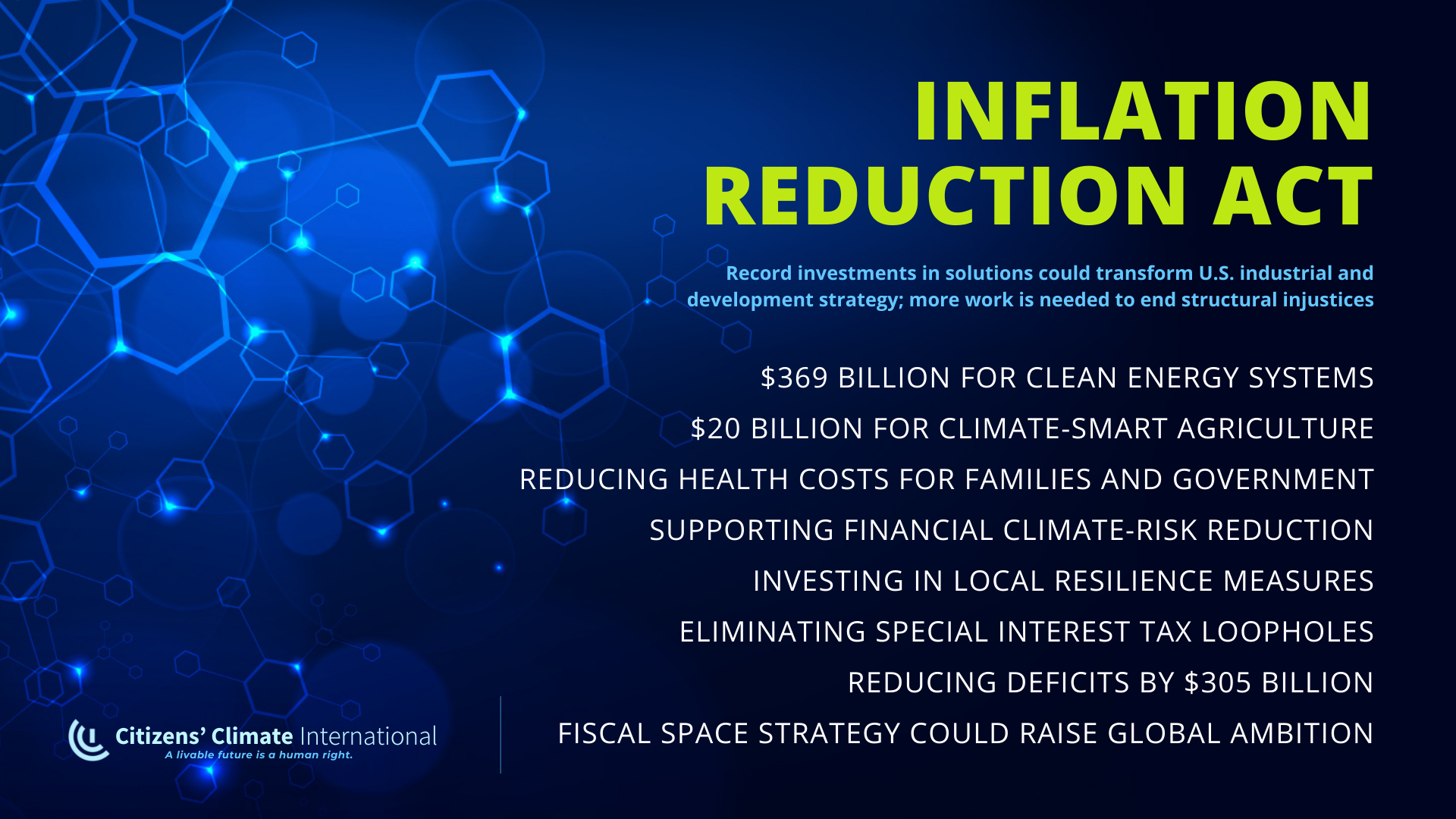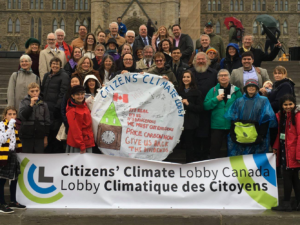
The most significant climate law in U.S. history models multi-dimensional ‘fiscal space’ strategy other nations can emulate.
When he signed the United Nations Framework Convention on Climate Change, in 1992, President George H.W. Bush said “The American way of life is not up for negotiation”. For that to be feasible, the transformation should have begun immediately. Had the substances burned to make energy been swiftly switched out for climate-friendly energy systems, most Americans might not have seen a change in their way of life.
The Convention is a ratified treaty, and so Article VI of the United States Constitution gives it the force of Constitutional law. For the U.S., action on climate is a legally binding national imperative.
Climate costs are accumulating quickly, everywhere.
Inaction has been incredibly costly. At this writing, most people now experience real-time impacts of global climate disruption in their everyday lives; tens of millions face increasingly extreme conditions.
- Towns have been destroyed by megafires, unprecedented floods, storms, and landslides.
- Farmers and ranchers are beset by prolonged drought, worsening water scarcity, and the long-term effects of collapsing mountain glaciers.
- Whole nations are being set back decades in their economic development by climate breakdown.
- The global food system is moving toward a state of permanent insecurity.
- The world is facing a debt crisis, the causes of which have been exacerbated by the degrading impacts of climate change.
The ability of people and communities to live their lives safely, freely, and with hope, is being undermined by those that have worked to prolong the dominance of outdated polluting energy systems. To steer ourselves out of danger, we must switch out polluting systems that bring us everyday goods and services, everywhere we can, as fast as we can.
New U.S. climate law is a major breakthrough.
On Tuesday, August 16, 2022, President Joseph R. Biden, Jr., signed the Inflation Reduction Act into law. He said the bill is indicative of the nation having moved into “a season of substance.” He celebrated the bill’s supporters in Congress for taking the side of people and communities against special interests that sought to block passage.
The new law is the most consequential climate legislation ever passed by the United States Congress. It will deliver more funding to climate solutions and resilience than any single policy action in world history. It is projected the new law’s climate provisions will reduce global heating emissions from the United States 40% by 2030.

40% below 2005 levels in 2030 will not bring the US to where it should have been, had it started this great transformation in earnest in 1992. Some key provisions depend on unproven carbon capture and sequestration (CCS) and should be adjusted to mobilize proven solutions as soon as possible. This target can, however, provide the strongest signal ever sent that all nations must rapidly phase down global heating pollution.
Moving the US economy firmly into a profitable decarbonization trend can unlock $130 trillion in financial holdings already committed to reaching net zero emissions by mid-century. Emerging financial regulations designed to identify and limit climate-related risk will help to lock in the mainstreaming effect of new public spending.
Structural injustices & new pollution need to be reversed.
We have to acknowledge, however, that there are serious gaps in the United States’ flagship climate law, which leave many communities facing structural injustice and threats to personal health and wellbeing. The Green Leadership Trust finds the Inflation Reduction Act will:
- “expand sacrifice zones to compound harm to our communities”;
- “offer up parts of the Gulf of Mexico and Alaska’s Cook Inlet for oil and gas development”;
- “[revise] a section of the Clean Water Act in a way that would make it more difficult to block or delay pipeline projects”;
- “excludes community based financial institutions, such as MDIs, CDFIs and credit unions, from directly benefiting and thus enabling climate finance”.
Making room for new leases for oil and gas exploration and production is a real problem; we cannot afford to continue burning fossil fuels, and we must rapidly phase down fossil fuel use everywhere. Stopping pollution that harms the health of frontline communities will speed the transition and make a better future possible for all; it is also a justice imperative. This is why CCI endorses the move for a Fossil Fuel Non-Proliferation Treaty.

Future fossil fuel production will pollute communities and degrade human health. We need to stop polluting, and we need to stop allocating the harm from that pollution to already vulnerable and disadvantaged communities. Image credit: Robin Sommer.
Communities can drive the most appropriate and imaginative long-term pathways to climate security. We will get closer to eliminating climate risk and threat faster if we include more people, favor participatory processes, and foster decision-making rooted in free, prior, and informed consent.
The Inflation Reduction Act does commit $60 billion to investment in front-line communities and to address environmental injustice. Advocates note, however, that this is a relatively small amount per year, per community, given the cumulative, and still accumulating, costs of long-running environmental injustice and selectively distributed pollution.
Multi-dimensional approach frees up resources to invest in climate transformation.
Many observers around the world have noted the unique “whole of government” approach embodied by the Inflation Reduction Act. Healthcare costs, access to care, and microeconomic (household) efficiency, are treated as part of an overall strategy for creating fiscal space for a sustained national investment in climate-related transformation.
The Inflation Reduction Act will reduce budget deficits by $305 billion. Over two decades, it is estimated it will reduce deficits by $1.9 trillion. It will close the tax gap (the difference between what is owed and what is paid) and eliminate special interest loopholes that favor transnational corporations, to ensure the tax system does more to empower small businesses, middle-class households, and working people, while giving less leeway to those who wish to profit from climate disruption.
The law’s healthcare provisions are part of this critical work of “creating fiscal space”. Inefficient and regressive tax systems, which deprive people of money, health, opportunity, and wellbeing, also degrade the fiscal stability and capability of the public sector. That means the whole society is less able to deal with crisis.
In addition to energy technology, innovation, and infrastructure, the Inflation Reduction Act dedicates $20 billion to climate-smart agriculture. Food systems are on the wrong side of the climate crisis, and new financing strategies are needed to make the transition to sustainable practices. The new assistance to farmers includes:
- $8.45 billion for the Environmental Quality Incentives Program (EQIP);
- $6.75 billion for the Regional Conservation Partnership Program (RCPP);
- $3.25 billion for the Conservation Stewardship Program (CSP);
- $1.4 billion for the Agricultural Conservation Easement Program (ACEP);
- $1 billion to boost conservation technical assistance through the US Department of Agriculture (USDA).
This isn’t the first major U.S. climate bill this month. The Atlantic reports that the CHIPS and Science Act—focused on major investment to expand domestic production of semiconductors in the United States—commits an estimated $67 billion toward zero-carbon innovation and climate-related research, over the next five years.
‘Fiscal space’ actions can spread climate transformation around the world.
The incentives and fiscal provisions create new grounds for aligning with the coming Carbon Border Adjustment Mechanism of the European Union. By setting conditions to reduce global heating emissions in the United States, the law will also create incentives for climate-smart trade.
The most climate vulnerable countries need that kind of trade to go mainstream. Many are facing debilitating costs from repeat shock climate impacts. They need International finance to recognize those costs are not under their control and to reward up-front investments in climate preparedness and resilience.
There will also be supply chain and international security benefits to the Inflation Reduction Act. By expanding domestic production of clean energy systems, the new law will send a clear message that coercive weaponization of energy and supply chain policy will be a losing gamble for those who try it.
This new law leaves a lot of work undone, but it does more to drive the U.S. toward a transition to a clean economy than any legislation before it. CCI will work with advocates seeking to eliminate harm and direct investment to front-line and underserved communities, and we will work to accelerate climate cooperation internationally.








